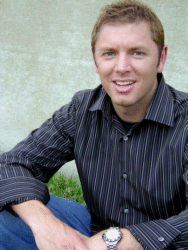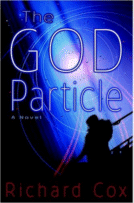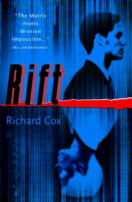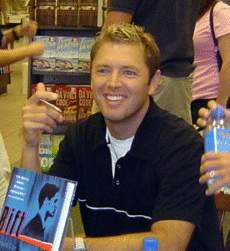A Conversation With Richard Cox
by Claire E. White
Born in Odessa, Texas, in 1970, author Richard Cox spent much of his childhood in the Lone Star State.

|
A fantasy football player, Richard met his agent through a recommendation from a fellow online player. That agent eventually sold Rift to Ballantine. The book had a two year delay in being published due to shakeups at Random House, so while he was waiting for Rift to be released, he started work on his next novel, The God Particle (Del Rey), a gripping SF thriller which explores the intersection between god, science and the universe. Kirkus calls The God Particle (Del Rey), "A gripper of a yarn, swatting around really big ideas."
Richard lives in Tulsa, Oklahoma, where he is part of the web team at Hilti, Inc. He writes in the evenings and on weekends. When he's not working or writing, you might find him playing basketball or golf or reading. He spoke with us about his road to the publication of his first novel, and his interest in the ongoing debate between religion and science in today's society. He also gives some great advice for aspiring writers.
What was the first fiction you ever wrote? What reaction did it receive?
I wrote my first story in 1982, when I was eleven. It was called "World War III and the Laser Interceptors" or something like that. I was beginning to learn a little about the Cold War and the nuclear stockpiles in our country and the Soviet Union, and in my story there was a system of satellites that the U.S. could use to shoot lasers at Soviet intercontinental ballistic missiles. But when the nuclear war started the lasers didn’t work, humans were mostly wiped out, and the survivors were forced to colonize the moon. This world-altering drama played out over the course of six handwritten pages. I showed it to a few of my friends, and they thought I was crazy. What kind of kid, they asked, would write six pages of something that wasn’t a school assignment?
What kinds of books did you like to read when you were growing up?
| "I wrote [The God Particle], in part, to address the religion vs. science debate. I think it’s an interesting discussion, and one that’s far from being resolved. Unfortunately there seems to be a gross misunderstanding of science among the general population, about what the scientific method actually is, what a theory really is, that sort of thing. Science and spirituality are not mutually exclusive." |
I also read Dean Koontz, I read Tolkien, I read some horror pulp. I read Arthur C. Clarke's 2001 and 2010. Obviously I was drawn to speculative stories, fantastical stuff, as a kid. I wish I had read more serious fiction then, other than what I was forced to read in school, but I didn’t. I think my own writing would have matured faster had my reading tastes been more varied.
When did you first realize that you wanted to be a writer?
After that first story I was always working on something, but I didn’t think of writing as a profession until my senior year of high school. Like every other kid at that age, I realized I wouldn’t be doing homework and taking tests forever, that pretty soon I would be working full time (I was already working part time at a restaurant). There weren’t many jobs that sounded appealing to me, but I loved to write, so I figured that was my calling.
I knew that making your living as a writer was difficult, because I’d picked up a copy of Writer’s Market hoping to find a place to sell one of my short stories. I never did sell one, but I did learn from the "how to" articles in Writer’s Market that it could take years to break through and sell a novel. So I went off to college to earn a degree that would help me land a "real" job. I didn’t have a single friend who wrote fiction, after all, and I certainly didn’t know anyone who made a living as a fiction writer. In fact I didn’t tell anyone for the longest time about my desire to be a writer. I didn’t grow up around a lot of artistic people. The smart people I knew wanted to succeed in business, grow up to be the next Alex P. Keaton. Or they wanted to be doctors. Or attorneys. My dad worked in the oil business; he worked for the same company for nearly forty years, and here I was, thinking that I’d rather make up stories and expect people to pay them for me. It seemed like a silly idea, a pipe dream. But I couldn’t help myself. In 1993 I began my first novel, and I didn’t finally sell one until nine years later, in 2002.
What kept you going during those years when you were trying to find an agent? What kept you from giving up?
Obsession. I wanted writing to be my career. It was the only thing I was passionate about enough to sit down and do, day after day, whether or not someone paid me (besides golf, but becoming a professional golfer seemed even less likely). I love reading, and I love writing, and I wanted that to be my life. For a while I was a member of the AOL Writers Club, and I would post short stories in the libraries there. I received lots of positive feedback from other aspiring writers. I printed those reviews and comments and kept them in a file, and in my darkest moments I would pull them out and read them and convince myself I had some measure of talent, however small. It was a lonely experience being a nobody from Texas, mailing letters and manuscripts to agents in New York, having them all rejected and sent back to me. But after I made the decision to write and sell a novel, I refused to give up until I had done it. So this brings me to my original answer: obsession.
I'd like to talk about your latest novel, The God Particle. What was your original inspiration for this story?

|
The story opens when auto exec Steve Keeley has one of the worst business trips in history: while in Zurich, he finds out his fiancé is cheating on him, he's thrown out of a third-story building and he has brain surgery, which gives him some very interesting abilities. A control freak, he has his entire future mapped out before him. He's not really that likable when readers first meet him, but as his experiences change him he becomes a much more sympathetic character. How did you approach the character of Steve? What was the greatest challenge in writing him?
I based Steve on a few people that I knew. One of these people was a driven guy who had this grand, detailed idea of what the rest of his life was going to be like, and that seemed a little absurd to me. There were other little details that I borrowed from friends and acquaintances, and many things that I made up. Steve’s character was designed to stand in contrast to Mike (the main physicist in the book), so I wanted him to be more self-confident, more decisive about things. Mike weighs his options, while Steve makes a decision and then drives full steam ahead. Steve is successful with women, Mike is not. But eventually Steve’s confidence backfires on him, and his well-structured life falls into disarray. I would say the greatest challenge writing him was in the first chapter, where I tried to draw his character well enough that the impending trauma would mean something to the reader. I also wanted to portray his hallucinations as vividly as possible, which was difficult, because much of what he experiences is not something he sees. He’s not sure how he senses it. When you try to describe sensations that you’ve never felt, that perhaps no one has, you risk coming across as cheesy or melodramatic. I tried hard to avoid that.
Steve is surrounded by some pretty nasty people at work, including a predatory and quite neurotic co-worker. And he works for a large, soulless international corporation. Should we read anything into your description of life at a big corporation?
Are you trying to get me fired from my day job? (laughs) You know, it’s fashionable to pick on large corporations, and it’s easy to do when you read about some of the conscienceless decisions made by asshole corporate executives. But corruption exists in companies of all sizes, and really the culture of any company is largely determined by the nature of the people who work there. At the beginning of The God Particle Steve is somewhat soulless himself, so he’s a natural fit for this particular company, and for the position he hopes to attain. The competition is fierce at the highest levels of any field, and those who make it are often forced to choose work over their family, free time, etc. This perfectly describes Steve’s situation.
Regarding Steve’s neurotic co-worker, I think we’ve all known someone who is the star in their very own daily soap opera. That’s all I have to say about that.
Mike McNair is the head physicist and director of the North Texas Superconducting Super Collider. He's an interesting character, a scientist who loves to ponder the big questions, including philosophical questions. How did you create him? How much do you have in common with Mike?
Mike shares my wonder of the universe. He wants to understand how things work, and he sees logic as the most likely route to the truth. In that sense Mike and I are very similar. And because logic works so well in his career, Mike wants to apply it to other areas of his life, like his by-the-numbers approach to approach women. This is something that struck me as very funny when I was developing his character, because Mike is a brilliant guy, a nice guy, and yet he’s mystified by the courting process. He experiences the emotions, the urges of a human, but he solves problems like a computer, and women don’t want to be approached by a computer. So I had fun with this contrast in his personal life, but ultimately the idea of combining emotional humanity and machine-like logic is taken a step further when he encounters Steve.
Mike has a relationship with a beautiful news anchor named Kelly Smith. What was the greatest challenge in creating Kelly? Were there any traits you were specifically trying to avoid with her?
| "Write your ass off. Write all the time and don’t fall in love with your words or scenes and be ready to rewrite an entire work if you or someone else has a really good idea how to make it better. Read whenever you’re not writing." |
There is a debate among readers about whether or not romance should be included in either hard SF novels or in mystery novels. What are your thoughts about romance in techno-thrillers? What went into your decision to focus on the love lives of the characters?
I’m not a big fan of genres and labels because of this very sort of thing. I just write stories, and I pick subjects that are interesting to me. When I began working on Rift I was very interested in high concept stories, and once it sold all signs pointed to me writing a similar follow-up. But within that framework I wanted to explore the real lives of real people, and that includes romance, sex, parental relationships, office politics, obsession, etc. I didn’t consciously focus on one aspect more than any other while writing The God Particle. I just pushed my characters’ lives out of balance and then helped them right the ship.
Mike (an agnostic) and Kelly (a Unitarian) met on a plane. The two exchange a very interesting series of emails in which they discuss religion versus science. What, if any, concerns did you have about diving into the religion vs. science debate?
I wrote this novel, in part, to address the religion vs. science debate. I think it’s an interesting discussion, and one that’s far from being resolved. Unfortunately there seems to be a gross misunderstanding of science among the general population, about what the scientific method actually is, what a theory really is, that sort of thing. Science and spirituality are not mutually exclusive. You can believe in God and still respect the discoveries of science, or you can be a champion of science and respect the spiritual beliefs of others. None of us have the ultimate answers, even though many people believe they do.
The most intriguing aspect of this subject is how different the two areas of thought really are. Having faith, as far as I understand it, is the idea of accepting something as truth without supporting evidence. And when that evidence does come -- in the form of visions, appearances, or emotions -- it cannot be independently verified or repeated. I do not mean to imply that these religious experiences don’t happen, or are somehow false -- only that they can’t be empirically proven. But that’s just what science is: proving ideas. With the scientific method, you observe a phenomenon, you guess why it might be happening, you make predictions about future occurrences of the phenomenon, and then run tests to see if your predictions come true. It’s a painstaking process that has produced a remarkable and comprehensive understanding of the world around us. It’s a method that seeks to eliminate man’s propensity to exaggerate, make false assumptions and assign importance to events that are statistically insignificant. We humans love drama, after all. We like to tell stories about strange or coincidental events that happen to us on a regular basis. For instance, when I drive to work in the morning, I often feel like the traffic lights are conspiring against me. I always complain to my cubicle neighbor when I hit every red light, but I never tell him when all the signals are green. I know if I documented my morning commute every day, I would dispel the idea that the traffic lights are conspiring against me. But where is the fun in that? What would I have to complain about?
Science doesn’t exist to disprove the existence of God. In fact, it has nothing to say about a supreme being because there is no way to empirically test God’s influence on our lives. In some ways there is no debate between science and religion. The two areas of thought are based on different ideas and serve different purposes. But I don’t see why they can’t coexist.
Particle physics and the idea of the elusive Higgs boson are not easy concepts to explain to someone with a non-scientific background, yet these concepts are explained very clearly in the book. How did you approach writing about the hard science elements of the book?

|
Can you give us a sneak peek into your next book?
Sure. Book 3 is about a group of friends who revisit their Texas hometown to lay to rest a secret from their past that seems to have returned. And once together, they have difficulty agreeing on what actually happened when they were kids, because none of them remember it in quite the same way. The book is much longer than either of my first two novels, and there are six main point-of-view characters, and the story occurs over several different time periods between 1964 and the present day. It’s quite different than Rift and The God Particle, but I hope it also represents a step forward for me as a writer.
I'd like to talk about your writing process. Will you take us through a typical writing day for you?
I write in the evenings because I have an Internet-related day job. I usually make it home around five-thirty, and after a work out and dinner, I write for about three hours. I'll also write half a day over the course of the weekend. I use a computer, and I average a little less than a thousand words a day. Sometimes when I'm nearing the end of a book, I'll take a few days off from work so I can get more hours in, which really helps because I’m able to stay in the story for many more hours at a time. And I always write to music. I generally listen to heavy electronic music while I'm writing, epic stuff, or psy trance, or even classical music, depending on the mood I'm trying to create. Listening to music really enhances my creativity for some reason. Often I sit on the couch in my living room, the lights off, the music loud. It may seem a little unorthodox, but I can really lose myself in the story that way.
How do you approach the editing phase of writing? Do you let anyone else read your work in progress?
I love editing. The first draft can be fun to write, but filling up those pages day after day becomes pretty grueling. When I go back to the story, however, the process of honing the prose, of tying loose story elements together, of finding the story you were trying to write in the first place -- that is very rewarding for me. I rediscover my own work when I rewrite, and what comes out of that process is always far better than the original work.
The earliest version I pass out for feedback is the second draft. I don't like to share my work in progress. In the past I did, but I learned that the best feedback comes when a beta reader can experience the story in the way it was intended. Reading chapters as they are written turns the novel into a serial work, and the final product will always be markedly different from the way I initially wrote it. Occasionally I share sections of a book that do not give away the central plot, if I want to know if a certain description or style of writing is working, but other than that I keep the story to myself until I’ve done at least one revision on it.
Have you ever suffered writer's block? How do you overcome it?
I don’t know if I’ve suffered block for more than a day or two, and then only because I’m not sure how I want to write a certain scene. I usually just sit in front of the computer and force myself to write junk until something good comes out. After I finish a novel I will lose interest in writing for a little while, especially when I’ve worked very hard in the weeks leading up to the end. But that’s not real writer’s block -- that’s just laziness.
What is your advice to aspiring writers?
Write your ass off. Write all the time and don’t fall in love with your words or scenes and be ready to rewrite an entire work if you or someone else has a really good idea how to make it better. Read whenever you’re not writing. Read things that are similar to what you like to write, and read lots of other stuff, too. Read serious fiction. Read classic literature. Don’t limit yourself to the books you want to emulate, because you’ll probably just write lesser-quality clones of them.
During the submission process, approach agents that represent work similar to what you write. You can learn who these agents are by using a reference like the Guide to Literary Agents, or by reading author acknowledgments, or by doing Internet research. It can also be helpful to attend literary conferences, because you have the opportunity to meet agents and editors there.
Most of all, if you really want to become a published author, you either have to be very lucky, very talented, or very persistent. Only one of those three is something you can directly control. Make the most of what you have.
What are your pet peeves in life?
I have little patience for people who are rude or obnoxious or loud. I don’t like repetitive tasks. I’m not a fan of films that use special effects or earsplitting action in the place of a good story. I don’t like it when a golfer lies about his handicap, and I don’t like it when people whine about their pet peeves.
What are your favorite ways to relax and have fun?
I’m an avid golfer. I would play every day if I could. I love movies, both at the theater and on my home entertainment system. I play basketball every week. I like to travel. And of course I’m never without a good book to read.
Who were your heroes (fictional or real) when you were growing up? What, to you, makes a real-life hero in today's world?

|
In my late teens Stephen King became a hero for me, because he also started with nothing, he wrote stories with supernatural elements in them (not the most admired genre), and still became one of the most popular and beloved authors in the world. King’s fantastical story elements drew me to him, but his serious fiction made me realize just how talented he was. His was the biggest influence on my decision to become a writer.
What's the best advice anyone has ever given you?
That’s a tough one. I guess it would be something my dad said to me once. He said that even though there are a lot of lucky people in the world, you can’t sit around and hope that luck might shine on you one day. If you want to ensure success, you have to make your own luck. Maybe that sounds like a cliché, or simple common sense, but it’s still true. And it made a big impression on me.
Return to the September 2005 issue of The IWJ.
More from Writers Write
